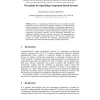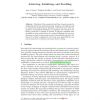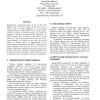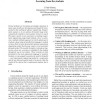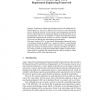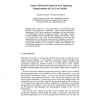106
click to vote
CBSE
2004
Springer
15 years 6 months ago
2004
Springer
There is a conceptual gap between the way we currently articulate requirements and the reuse-driven paradigm embodied in component-based system development. The principal challenge...
106
click to vote
ER
2007
Springer
15 years 6 months ago
2007
Springer
Abstract. Definitions of the concepts derived from the goal concept (including functional and nonfunctional goal, hardgoal, and softgoal) used in requirements engineering are discu...
124
click to vote
RE
1997
Springer
15 years 7 months ago
1997
Springer
The field of requirements engineering emerges out of tradition of research and engineering practice that stresses rtance of generalizations and abstractions. abstraction is essent...
121
click to vote
WETICE
1998
IEEE
15 years 7 months ago
1998
IEEE
Requirements engineering (RE) is a necessary part of the software development process, as it helps customers and designers identify necessary system requirements. If these stakeho...
126
click to vote
DEXAW
1999
IEEE
15 years 7 months ago
1999
IEEE
Requirements engineering ranks as one of the most difficult and error-prone phases in the life cycle of devices such as mobile telephones. It is of critical importance because of ...
105
Voted
ASWEC
2000
IEEE
15 years 7 months ago
2000
IEEE
Formal methods are becoming increasingly important in many areas of software development and should be incorporated in the teaching of software engineering. Requirements capture i...
145
click to vote
ADAEUROPE
2001
Springer
15 years 7 months ago
2001
Springer
Requirements engineering (RE) is concerned with the elicitation of the goals to be achieved by the system envisioned, the operationalization of such goals into specifications of se...
125
Voted
RE
2009
Springer
15 years 7 months ago
2009
Springer
Increasingly complex supplier-relationships dominate product development, independent of industries and products. Mostly the primary source of risks and later problems is insuffic...
105
Voted
ER
2003
Springer
15 years 8 months ago
2003
Springer
Abstract. Requirements Engineering techniques, based on the fundamental notions of agency, i.e., Agent, Goal, and Intentional Dependency, have been recognized as having the potenti...
130
click to vote
CAISE
2003
Springer
15 years 8 months ago
2003
Springer
Early Aspects is a concept that applies an aspect-oriented (AO) paradigm to the requirements engineering. Aspect-Oriented Requirements Engineering (AORE) can be considered as an im...
